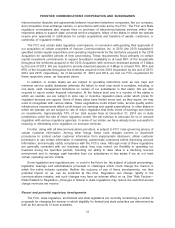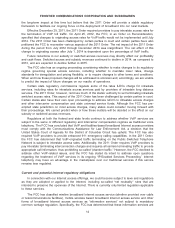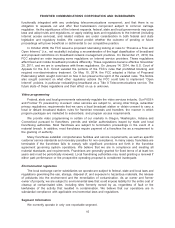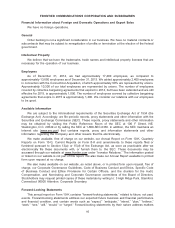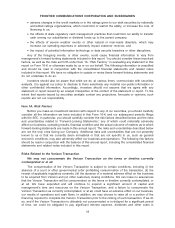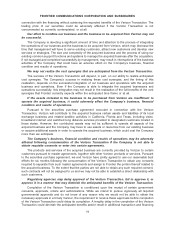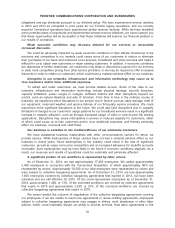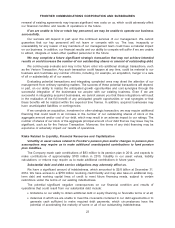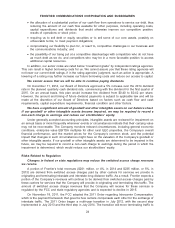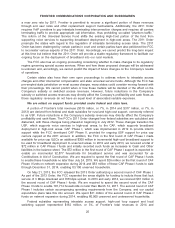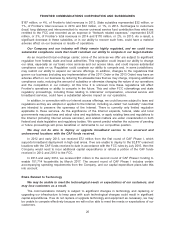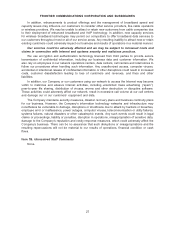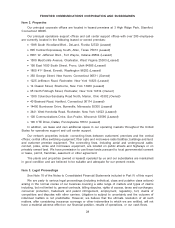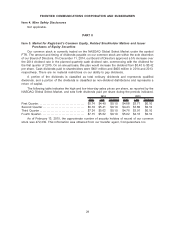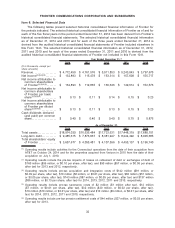Frontier Communications 2014 Annual Report Download - page 23
Download and view the complete annual report
Please find page 23 of the 2014 Frontier Communications annual report below. You can navigate through the pages in the report by either clicking on the pages listed below, or by using the keyword search tool below to find specific information within the annual report.obligations and pay dividends pursuant to our dividend policy. We have experienced revenue declines
in 2014 and 2013 as compared to prior years for our Frontier legacy operations, and our recently
acquired Connecticut operations have experienced similar revenue declines. While we have identified
some potential areas of opportunity and implemented several revenue initiatives, we cannot assure you
that these opportunities will be successful or that these initiatives will improve our financial position or
our results of operations.
Weak economic conditions may decrease demand for our services or necessitate
increased discounts.
We could be adversely impacted by weak economic conditions or their effects. Downturns in the
economy and competition in our markets could cause some of our customers to reduce or eliminate
their purchases of our basic and enhanced voice services, broadband and video services and make it
difficult for us to obtain new customers or retain existing customers. In addition, if economic conditions
are depressed or further deteriorate, our customers may delay or discontinue payment for our services
or seek more competitive pricing from other service providers, or we may be required to offer increased
discounts in order to retain our customers, which could have a material adverse effect on our business.
Disruption in our networks, infrastructure and information technology may cause us to
lose customers and/or incur additional expenses.
To attract and retain customers, we must provide reliable service. Some of the risks to our
networks, infrastructure and information technology include physical damage, security breaches,
capacity limitations, power surges or outages, software defects and other disruptions beyond our
control, such as natural disasters and acts of terrorism. From time to time in the ordinary course of
business, we experience short disruptions in our service due to factors such as cable damage, theft of
our equipment, inclement weather and service failures of our third-party service providers. We could
experience more significant disruptions in the future. We could also face disruptions due to capacity
limitations if changes in our customers’ usage patterns for our broadband services result in a significant
increase in capacity utilization, such as through increased usage of video or peer-to-peer file sharing
applications. Disruptions may cause interruptions in service or reduced capacity for customers, either
of which could cause us to lose customers and/or incur additional expenses, and thereby adversely
affect our business, revenues and cash flows.
Our business is sensitive to the creditworthiness of our wholesale customers.
We have substantial business relationships with other communications carriers for whom we
provide service. While bankruptcies of these carriers have not had a material adverse effect on our
business in recent years, future bankruptcies in the industry could result in the loss of significant
customers, as well as cause more price competition and an increased allowance for doubtful accounts
receivable. Such bankruptcies may be more likely in the future if economic conditions stagnate. As a
result, our revenues and results of operations could be materially and adversely affected.
A significant portion of our workforce is represented by labor unions.
As of December 31, 2014, we had approximately 17,400 employees. We added approximately
2,400 employees in connection with the Connecticut Acquisition, of which approximately 90% are
represented by unions. Approximately 10,300 of our total employees were represented by unions and
were subject to collective bargaining agreements. As of December 31, 2014, we had approximately
1,000 employees covered by collective bargaining agreements that expired in 2014, but have been
extended and are still effective for 2015. Of the union-represented employees as of December 31,
2014, approximately 1,400, or 13%, of the unionized workforce are covered by collective agreements
that expire in 2015 and approximately 2,200, or 21%, of the unionized workforce are covered by
collective bargaining agreements that expire in 2016.
We cannot predict the outcome of negotiations of the collective bargaining agreements covering
our employees. If we are unable to reach new agreements or renew existing agreements, employees
subject to collective bargaining agreements may engage in strikes, work slowdowns or other labor
actions, which could materially disrupt our ability to provide services. New labor agreements or the
22
FRONTIER COMMUNICATIONS CORPORATION AND SUBSIDIARIES


